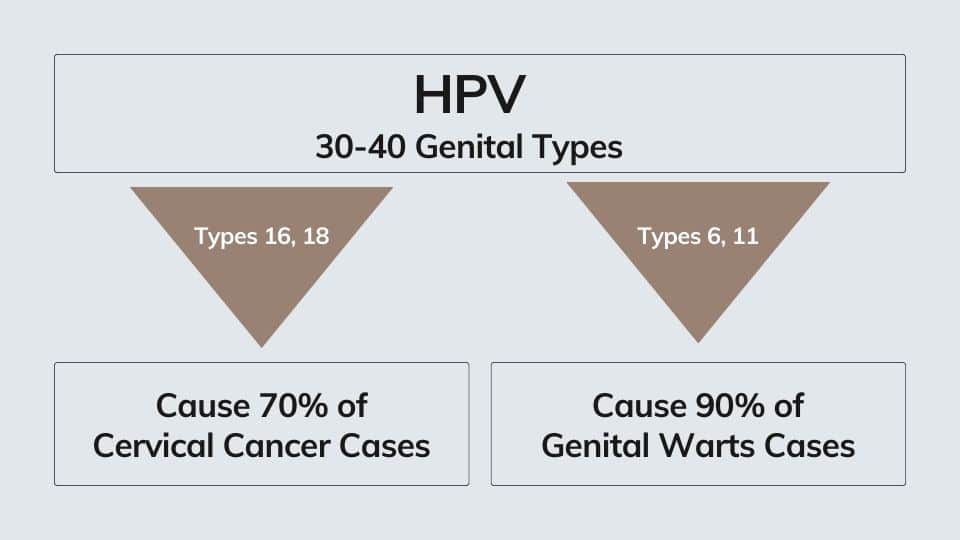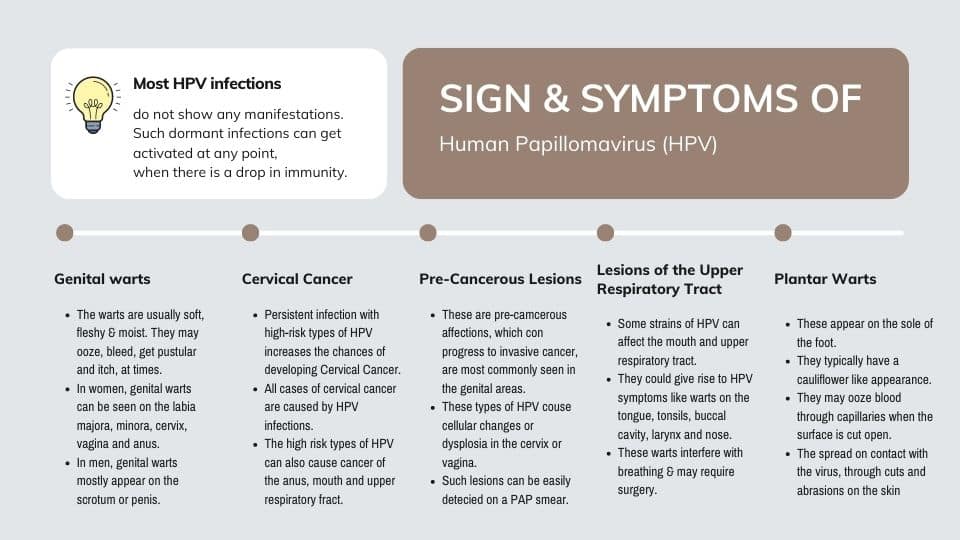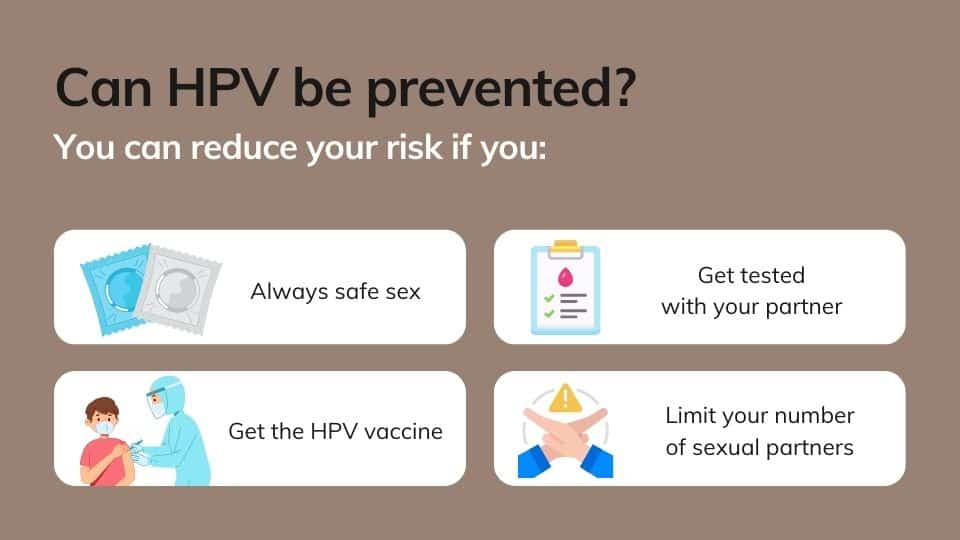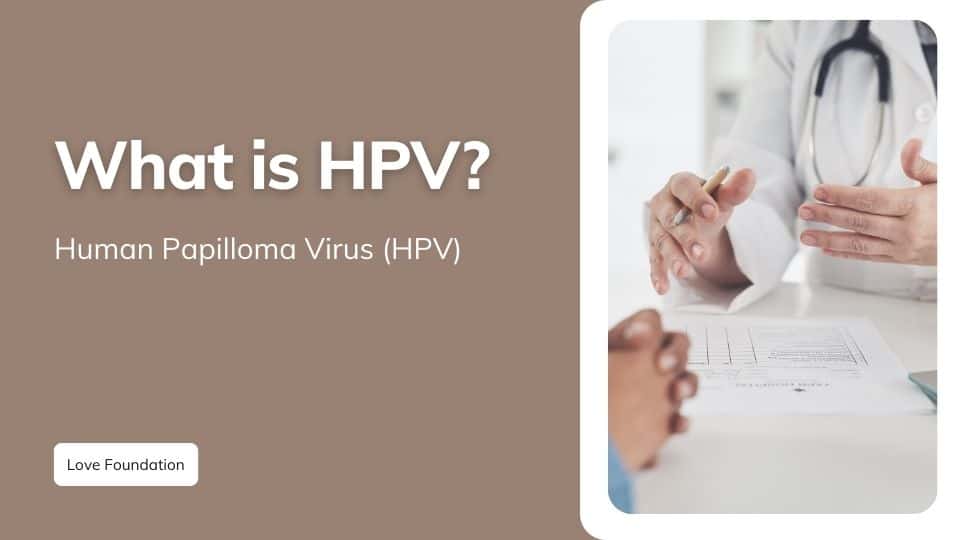What is HPV?
Human papillomavirus (HPV) is a group of related viruses. They can cause warts on different parts of your body. There are more than 200 types. About 40 of them are spread through direct sexual contact with someone who has the virus. They can also spread through other intimate, skin-to-skin contact. Some of these types can cause cancer.

There are two categories of sexually transmitted HPV. Low-risk HPV can cause warts on or around your genitals, anus, mouth, or throat. High-risk HPV can cause various cancers:
- Cervical cancer
- Anal cancer
- Some types of oral and throat cancer
- Vulvar cancer
- Vaginal cancer
- Penile cancer
Most HPV infections go away on their own and don’t cause cancer. But sometimes the infections last longer. When a high-risk HPV infection lasts for many years, it can lead to cell changes. If these changes are not treated, they may get worse over time and become cancer.
What causes Human Papillomavirus?
- The virus that causes HPV infection is transmitted through skin-to-skin contact. Most people get a genital HPV infection through direct sexual contact, including vaginal, anal, and oral sex.
- Because HPV is a skin-to-skin infection, intercourse isn’t required for transmission to occur.
- HPV infection occurs when the virus enters your body, usually through a cut, abrasion or small tear in your skin. The virus is transferred primarily by skin-to-skin contact.
- Genital HPV infections are contracted through sexual intercourse, anal sex and other skin-to-skin contact in the genital region. Some HPV infections that result in oral or upper respiratory lesions are contracted through oral sex.
- Many people have HPV and don’t even know it, which means you can still contract it even if your partner doesn’t have any symptoms. It’s also possible to have multiple types of HPV. Warts are contagious. They can spread through direct contact with a wart. Warts can also spread when someone touches something that already touched a wart.
- In rare cases, a mother who has HPV can transmit the virus to her baby during delivery. When this happens, the child may develop a condition called recurrent respiratory papillomatosis where they develop HPV-related warts inside their throat or airways. Or Rarely, the infection may cause a noncancerous growth in the baby’s voice box (larynx).
How is Human Papillomavirus spread?
You can get HPV by having vaginal, anal, or oral sex with someone who has the virus. It is most commonly spread during vaginal or anal sex. It also spreads through close skin-to-skin touching during sex. A person with HPV can pass the infection to someone even when they have no signs or symptoms.
If you are sexually active, you can get HPV, even if you have had sex with only one person. You also can develop symptoms years after having sex with someone who has the infection. This makes it hard to know when you first got it.
Who is at risk of getting Human Papillomavirus?
HPV infections are common. Risk factors for HPV infection include:
- Number of sexual partners. The more sexual partners you have, the more likely you are to contract a genital HPV infection. Having sex with a partner who has had multiple sex partners also increases your risk.
- Age. Common warts occur mostly in children. Genital warts occur most often in adolescents and young adults.
- Weakened immune systems. People who have weakened immune systems are at greater risk of HPV infections. Immune systems can be weakened by HIV/AIDS or by immune system-suppressing drugs used after organ transplants.
- Damaged skin. Areas of skin that have been punctured or opened are more prone to develop common warts.
- Personal contact. Touching someone’s warts or not wearing protection before contacting surfaces that have been exposed to HPV — such as public showers or swimming pools — might increase your risk of HPV infection.
- having sex without using barrier protection, such as a condom or dental dam
- not having the HPV vaccination
- has other sexually transmitted infections, such as gonorrhea, chlamydia, and herpes simplex
- delivered their first baby at a young age
- has given birth to many children
- smokes tobacco products
What are the symptoms of HPV infections?
In most cases, your body’s immune system defeats an HPV infection before it creates warts. When warts do appear, they vary in appearance depending on which kind of HPV is involved:
- Genital warts. These appear as flat lesions, small cauliflower-like bumps or tiny stemlike protrusions. In women, genital warts appear mostly on the vulva but can also occur near the anus, on the cervix or in the vagina.
- In men, genital warts appear on the penis and scrotum or around the anus. Genital warts rarely cause discomfort or pain, though they may itch or feel tender.
- Common warts. Common warts appear as rough, raised bumps and usually occur on the hands and fingers. In most cases, common warts are simply unsightly, but they can also be painful or susceptible to injury or bleeding.
- Plantar warts. Plantar warts are hard, grainy growths that usually appear on the heels or balls of your feet. These warts might cause discomfort.
- Flat warts. Flat warts are flat-topped, slightly raised lesions. They can appear anywhere, but children usually get them on the face and men tend to get them in the beard area. Women tend to get them on the legs.

HPV in men
Many men who contract an HPV infection have no symptoms, although some may develop genital warts. See your doctor if you notice any unusual bumps or lesions on your penis, scrotum, or anus.
Some strains of HPV can cause penile, anal, and throat cancer in men. Some men may be more at risk for developing HPV-related cancers, including men who receive anal sex and men with a weakened immune system.
The strains of HPV that cause genital warts aren’t the same as those that cause cancer. Get more information about HPV infection in men.
HPV in women
It’s estimated that 80 percent trusted source of women will contract at least one type of HPV during their lifetime. Like with men, many women that get HPV don’t have any symptoms and the infection goes away without causing any health problems.
Some women may notice that they have genital warts, which can appear inside the vagina, in or around the anus, and on the cervix or vulva.
Make an appointment with your doctor if you notice any unexplained bumps or growths in or around your genital area.
Some strains of HPV can cause cervical cancer or cancers of the vagina, anus, or throat. Regular screening can help detect the changes associated with cervical cancer in women. Additionally, DNA tests on cervical cells can detect strains of HPV associated with genital cancers.
Cervical cancer
Nearly all cervical cancers are caused by HPV infections, but cervical cancer may take 20 years or longer to develop after an HPV infection. The HPV infection and early cervical cancer typically don’t cause noticeable symptoms. Getting vaccinated against HPV infection is your best protection from cervical cancer.
Because early cervical cancer doesn’t cause symptoms, it’s vital that women have regular screening tests to detect any precancerous changes in the cervix that might lead to cancer. Current guidelines recommend that women ages 21 to 29 have a Pap test every three years.
Women ages 30 to 65 are advised to continue having a Pap test every three years, or every five years if they also get the HPV DNA test at the same time. Women over 65 can stop testing if they’ve had three normal Pap tests in a row, or two HPV DNA and Pap tests with no abnormal results.
Complications
- Oral and upper respiratory lesions. Some HPV infections cause lesions on your tongue, tonsils, soft palate, or within your larynx and nose.
- Cancer. Certain strains of HPV can cause cervical cancer. These strains might also contribute to cancers of the genitals, anus, mouth and upper respiratory tract.
When to see a doctor
If you or your child has warts of any kind that cause embarrassment, discomfort or pain, seek advice from your doctor.
How is Human Papillomavirus diagnosed?
If warts or lesions are visible, a doctor can usually diagnose HPV with a visual examination. Also, tests can confirm the presence of the virus.
When to get tested for HPV?
TestsTrusted Source for HPV or related cervical cellular changes include:
- a Pap smear
- a DNA test
- a biopsy
- A Pap smear, also called a cervical smear, involves collecting and testing cells from the surface of the cervix or vagina. It can reveal any cellular abnormalities that may lead to cancer.
A DNA test can evaluate for high-risk types of HPV, and a doctor may use it alongside a Pap smear.
A biopsy, which involves taking a sample of affected skin, may be necessary if a test reveals unusual cell changes.
There is currently no routine screening for HPV in males, and the range of testing options is limited. Some experts have called for more testing, especially for men who have sex with men.
How does HPV specifically affect males?
If a person has receptive anal sex, a doctor may recommend an anal Pap smear.
A person can also test for HPV at home but it is important to see a doctor to confirm the diagnosis. The home test can not detect cancer.
How is Human Papillomavirus treated?
Most cases of HPV go away on their own, so there’s no treatment for the infection itself. Instead, your doctor will likely want to have you come in for repeat testing in a year to see if the HPV infection persists and if any cell changes have developed that need further follow-up.
Genital warts can be treated with prescription medications, burning with an electrical current, or freezing with liquid nitrogen. But, getting rid of the physical warts doesn’t treat the virus itself, and the warts may return.
Precancerous cells may be removed through a short procedure that’s performed at your doctor’s office. Cancers that develop from HPV may be treated by methods such as chemotherapy, radiation therapy, or surgery. Sometimes, multiple methods may be used.
There currently aren’t any medically-supported natural treatments available for HPV infection.
Routine screening for HPV and cervical cancer is important for identifying, monitoring, and treating health problems that may result from HPV infection. Explore the treatment options for HPV.

How to prevent Human Papillomavirus?
- Common warts. It’s difficult to prevent HPV infections that cause common warts. If you have a common wart, you can prevent the spread of the infection and formation of new warts by not picking at a wart and not biting your nails.
- Plantar warts. To reduce the risk of contracting HPV infections that cause plantar warts, wear shoes or sandals in public pools and locker rooms.
- Genital warts. You can reduce your risk of developing genital warts and other HPV-related genital lesions by:
- Being in a mutually monogamous sexual relationship
- Reducing your number of sex partners
- Using a latex condom, which can reduce your risk of HPV transmission
- Not have sex while genital warts are present.
- Avoid touching the wart unnecessarily.
- Wash the hands after touching a wart.
- Avoid shaving over a wart.
- Treat and cover a wart until it disappears.
- Avoid sharing towels and other personal items.
- Get the HPV vaccine.
HPV and pregnancy
Contracting HPV doesn’t decrease your chances of becoming pregnant. If you’re pregnant and have HPV, you may wish to delay treatment until after delivery. However, in some cases, HPV infection can cause complications.
Hormonal changes that occur during pregnancy may cause genital warts to grow and in some cases, these warts may bleed. If genital warts are widespread, they may make a vaginal delivery difficult.
When genital warts block the birth canal, a C-section may be required.
In rare cases, a woman with HPV can pass it on to her baby. When this happens, a rare but serious condition called recurrent respiratory papillomatosis may occur. In this condition, children develop HPV-related growths in their airways.
Cervical changes can still occur during pregnancy, so you should plan to continue routine screening for cervical cancer and HPV while you’re pregnant. Discover more about HPV and pregnancy.
References
Genital HPV Infection – Fact Sheet https://www.cdc.gov/std/hpv/stdfact-hpv.htm
HPV infection https://www.mayoclinic.org/diseases-conditions/hpv-infection/symptoms-causes/syc-20351596
Everything you Need to Know About Human Papillomavirus Infection
https://www.healthline.com/health/human-papillomavirus-infection#_noHeaderPrefixedContent
What is human papillomavirus (HPV)? https://www.medicalnewstoday.com/articles/246670#symptoms
HPV https://medlineplus.gov/hpv.html

